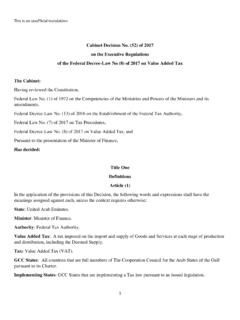Transcription of A LAW TO AMEND THE LOCAL COMPANIES (CONTROL) LAW …
1 CAYMAN ISLANDS. Supplement No. 1 published with Gazette No. 12. dated 5th June, 2017. THE DATA PROTECTION LAW, 2017. (LAW 33 OF 2017). The Data Protection Law, 2017. THE DATA PROTECTION LAW, 2017. ARRANGEMENT OF SECTIONS. PART 1 - INTERPRETATION, PRINCIPLES, APPLICATION, OBLIGATIONS AND OFFICE. 1. Short title and commencement 2. Interpretation 3. Sensitive personal data 4. Special purposes 5. The data protection principles: content, consent and duty to comply 6. Application of Law: duty to nominate a Cayman Islands representative 7. Information Commissioner PART 2 - RIGHTS AND RESPONSIBILITIES OF DATA SUBJECTS AND. OTHERS. 8. Fundamental rights of access to personal data 9. Treatment of requests under section 8. 10. Right to stop processing 11. Right to stop processing for direct marketing 12. Rights in relation to automated decision-making 13. Compensation for failure to comply 14.
2 Rectification, blocking, erasure or destruction PART 3 - RESTRICTED PROCESSING AND PERSONAL DATA. BREACHES. 15. Preliminary determination by Commissioner as to restricted processing 16. Personal data breaches PART 4 - EXEMPTIONS. 17. Effect of this Part 18. National security 19. Crime, government fees and duties 20. Health, education or social work 21. Monitoring, inspection or regulatory function 22. Journalism, literature or art 23. Research, history or statistics 24. Information available to public by or under enactments 25. Disclosures required by law or made in connection with legal proceedings 2. The Data Protection Law, 2017. 26. Personal, family or household affairs 27. Honours 28. Corporate finance 29. Negotiations 30. Legal professional privilege and trusts 31. Exemptions by regulations PART 5 - FUNCTIONS OF INFORMATION COMMISSIONER. 32. Independence and powers 33. Commissioner to be subject to Public Service Management Law (2013.)
3 Revision). 34. Functions of Commissioner 35. Documents signed by Commissioner 36. Reports to Legislative Assembly and budget 37. International cooperation 38. Protection of Commissioner 39. Defamation 40. Consultation of Commissioner 41. Promotion of the Law by Commissioner 42. Codes of practice PART 6 - ENFORCEMENT. 43. Complaints 44. Information orders 45. Enforcement orders 46. Failure to comply with order 47. Right to seek judicial review 48. Commissioner to certify 49. Disclosure of information 50. Confidentiality of information 51. Entry and search of premises 52. Warrant not exercisable 53. Offences in respect of warrants 54. Unlawful obtaining etc. of personal data 55. Power of the Commissioner to impose monetary penalty 56. Guidance about monetary penalty orders 57. General provisions relating to offences 58. Liability for offences PART 7 - GENERAL. 59. Law binds Crown 60.
4 Service of orders, etc. 61. Regulations 3. The Data Protection Law, 2017. SCHEDULE 1: The Data Protection Principles and their Interpretation SCHEDULE 2: First Principle - Conditions for Processing of Personal Data SCHEDULE 3: First Principle - Conditions for Processing of Sensitive Personal Data SCHEDULE 4: Transfers to which Eighth Principle does not apply SCHEDULE 5: Conditions of Consent 4. The Data Protection Law, 2017. CAYMAN ISLANDS. Law 33 of 2017. I Assent Helen Kilpatrick Governor. 18th May, 2017. A LAW TO PROVIDE FOR THE PROTECTION OF PERSONAL DATA;. AND FOR INCIDENTAL AND CONNECTED PURPOSES. ENACTED by the Legislature of the Cayman Islands. PART 1 - INTERPRETATION, PRINCIPLES, APPLICATION, OBLIGATIONS AND OFFICE. 1. (1) This Law may be cited as the Data Protection Law, 2017. Short title and commencement (2) This Law shall come into force on such date as may be appointed by Order made by the Cabinet, and different dates may be appointed for different provisions of this Law and in relation to different matters.
5 2. In this Law - Interpretation business includes any trade or profession;. Commissioner means the Information Commissioner appointed under section 35 of the Freedom of Information Law (2015 Revision); (2015 Revision). consent in relation to a data subject means any freely given, specific, informed and unambiguous indication of the data subject's wishes by which the data subject, by a statement or by a clear affirmative action, signifies agreement to the processing of personal data relating to the said data subject;. 5. The Data Protection Law, 2017. data controller means the person who, alone or jointly with others determines the purposes, conditions and manner in which any personal data are, or are to be, processed and includes a LOCAL representative referred to in section 6(2);. data processor means any person who processes personal data on behalf of a data controller but, for the avoidance of doubt, does not include an employee of the data controller.
6 Data protection principles has the meaning referred to in section 5;. data subject means - (a) an identified living individual; or (b) a living individual who can be identified directly or indirectly by means reasonably likely to be used by the data controller or by any other person;. enforcement order means an order under section 45;. health professional means an individual registered to practise under any of the professions specified in the Health Practice Law (2013 Revision). (2013 Revision) or any other Law relating to health;. health record means a record that - (a) consists of information relating to the physical health, mental health or condition of a data subject; and (b) has been made by or on behalf of a health professional in connection with the care of that data subject;. inaccurate , in relation to personal data, includes data that are misleading, incomplete or out of date.
7 Non-disclosure provisions means the following provisions to the extent that they are inconsistent with the disclosure in question - Schedules 2 and 3 (a) the first data protection principle, except to the extent to which it requires compliance with the conditions in Schedules 2 and 3;. (b) the second and third data protection principles; and (c) sections 10 and 14;. person includes any corporation, either aggregate or sole, and any club, society, association, public authority or other body, of one or more persons;. personal data means data relating to a living individual who can be identified and includes data such as - 6. The Data Protection Law, 2017. (a) the living individual's location data, online identifier or one or more factors specific to the physical, physiological, genetic, mental, economic, cultural or social identity of the living individual;. (b) an expression of opinion about the living individual; or (c) any indication of the intentions of the data controller or any other person in respect of the living individual.
8 Personal data breach means a breach of security leading to the accidental or unlawful destruction, loss, alteration, unauthorized disclosure of or, access to, personal data transmitted, stored or otherwise processed;. processing , in relation to data, means obtaining, recording or holding data, or carrying out any operation or set of operations on personal data, including - (a) organizing, adapting or altering the personal data;. (b) retrieving, consulting or using the personal data;. (c) disclosing the personal data by transmission, dissemination or otherwise making it available; or (d) aligning, combining, blocking, erasing or destroying the personal data;. public authority means - (a) a ministry, portfolio or department;. (b) a statutory body or authority, whether incorporated or not;. (c) a company which - (i) is wholly owned by the Government or in which the Government has a direct or indirect controlling interest; or (ii) is specified in an Order made by the Cabinet; and (d) any other body or organization specified by the Cabinet by Order as a public authority on account of providing services of a public nature which are essential to the welfare of Caymanian society.
9 Public register means any register that, pursuant to a requirement imposed by Law or in pursuance of an international agreement, is open to public inspection or open to inspection by any person having a legitimate interest in the subject matter of the register;. publish , in relation to journalistic, literary or artistic material, means to make available to the public or any section of the public;. recipient , in relation to personal data, includes a person to whom the data are disclosed, as well as any person (such as an employee or agent of the relevant data controller, a relevant data processor, or an employee or agent of a data processor) to whom they are disclosed in the course of processing the data for the 7. The Data Protection Law, 2017. data controller, but does not include a person to whom disclosure is or may be made as a result of, or with a view to, a particular inquiry by or on behalf of that person made in the exercise of any power conferred by law.
10 Registered company means a company within the meaning of section 2 of the COMPANIES Law (2013 Revision); (2013 Revision). regulations means regulations made under this Law;. sensitive personal data has the meaning assigned in section 3;. special purposes has the meaning assigned in section 4;. staff , in relation to the Commissioner, includes any individual employed in the office of the Commissioner;. subject information provisions means - (a) the first data protection principle to the extent to which it requires Schedule 1 compliance with paragraph 2 of Part 2 of Schedule 1; and (b) section 8; and third party , in relation to personal data, means any person other than - (a) the data subject;. (b) the data controller; or (c) any data processor or other person authorized to process data for the data controller or data processor. Sensitive personal data 3. In this Law, sensitive personal data means, in relation to a data subject, personal data consisting of - (a) the racial or ethnic origin of the data subject.













